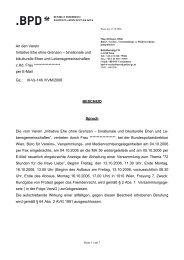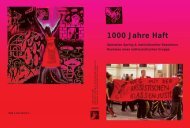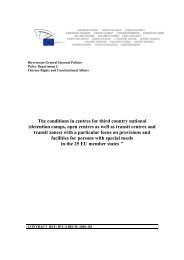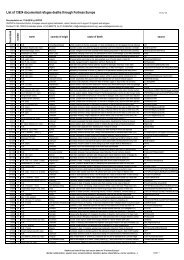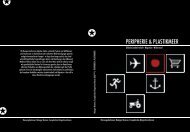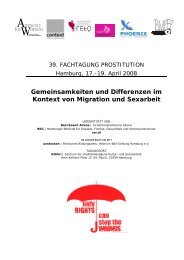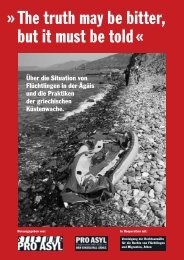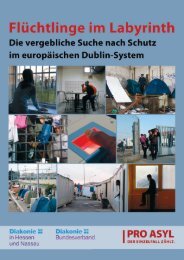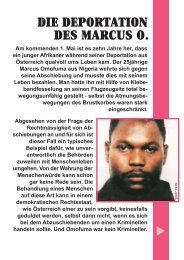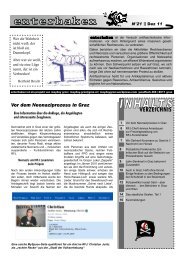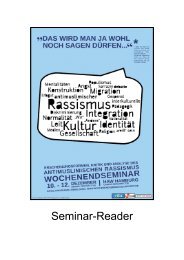Turin's CIE - International University College of Turin
Turin's CIE - International University College of Turin
Turin's CIE - International University College of Turin
Create successful ePaper yourself
Turn your PDF publications into a flip-book with our unique Google optimized e-Paper software.
If a <strong>CIE</strong> detainee has children, then that detainees’ validation or extension hearing will nearly<br />
always be subject to the “best interests <strong>of</strong> the child” test under Article 3(1) CRC 32 . Validation and<br />
extension hearings are administrative decisions “concerning children” because when a parent is<br />
detained their child suffers a long separation from that parent, for what is <strong>of</strong>ten months <strong>of</strong> <strong>CIE</strong><br />
detention or even years <strong>of</strong> separation after a forced deportation. Similarly, if Prefetto 33 or the<br />
Ministry <strong>of</strong> the Interior (Ministro dell’Interno) issues a return decision 34 (deportation order)<br />
then they are also obliged to give primary consideration to the best interests <strong>of</strong> the irregular<br />
migrant’s children when they decide whether or not it would be more appropriate to issue a<br />
decree for voluntary departure 35 instead <strong>of</strong> detaining that migrant in an Italian <strong>CIE</strong>. It is<br />
worthwhile to recall that under EU Directive 2008/115/EC, State Parties should only use<br />
immigration detention as a last resort. States should promote voluntary departure by<br />
establishing a general rule that “[a] return decision shall provide for an appropriate period for<br />
voluntary departure <strong>of</strong> between seven and thirty days” 36 where there is no reason to believe<br />
that this would undermine the purpose <strong>of</strong> the return procedure.<br />
There is strong evidence to suggest that some administrative decision makers are not adhering<br />
to their legal obligation to consider the best interests <strong>of</strong> the child as the primary consideration.<br />
Firstly, there are situations that strongly suggest that the administrative decision maker did not<br />
make a considered decision about whether detention <strong>of</strong> the parent is justifiable. Secondly, there<br />
are questions as to whether administrative decision makers could be considering the best<br />
interests <strong>of</strong> a child as a primary consideration in cases where they have detained a parent in a<br />
<strong>CIE</strong> that is a long way from the region in Italy where the child lives. For instance, we interviewed<br />
one lady whose nine-year-old daughter lives in Rome. The girl had not been able to visit her<br />
mother because <strong>of</strong> the distance between Rome and <strong>Turin</strong> (670 km). The daughter was born in<br />
Italy, attends school in Rome and resides with the grandmother who has a valid permit to live in<br />
Italy: “The problem is that I am stressed because I cannot see my daughter […] I want to die,<br />
because I miss my family too much” (Interview 11).<br />
One <strong>of</strong> the two detainees who had actually seen their family since being detained spoke <strong>of</strong> the<br />
difficult financial burden that now stopped his wife and daughter from being able to visit him:<br />
“Also, she [my wife] cannot come to visit me anymore. Previously, I could see my daughter and now<br />
I cannot see her anymore. They came to visit me three or four times [in the past]. My ex and my son<br />
also came to visit. I have a good relationship with them” (Interview 20). This detainee had lived in<br />
Italy for twenty years and he was one <strong>of</strong> the few detainees with family in the Piedmont region.<br />
He was in his third month <strong>of</strong> <strong>CIE</strong> detention and separation from his two children.<br />
Families are also broken up across the European Union. One detainee without EU citizenship<br />
had been in <strong>CIE</strong> for five months despite the fact that his EU citizen wife and his child both<br />
currently live together in Poland after leaving Italy and they would like him to come to Poland to<br />
32 An exception might exist in rare cases where the detainee is parent to a child for whom they have no prior<br />
contact. However, the administrative decision maker will still need to consider, as the primary consideration,<br />
what the best interests <strong>of</strong> that child would be.<br />
33 The Prefetto is the head <strong>of</strong> the Italian Prefettura (see glossary).<br />
34 Article 3(4) <strong>of</strong> Directive 2008/115/EC defines a “return decision” as “an administrative or judicial decision or<br />
act, stating or declaring the stay <strong>of</strong> a third-country national to be illegal and imposing or stating an obligation to<br />
return”.<br />
35 Article 3(8) <strong>of</strong> Directive 2008/115/EC defines “voluntary departure” as “compliance with the obligation to<br />
return within the time-limit fixed for that purpose in the return decision”.<br />
36 Directive 2008/115/EC, Article 7(1).<br />
22 | P a g e




